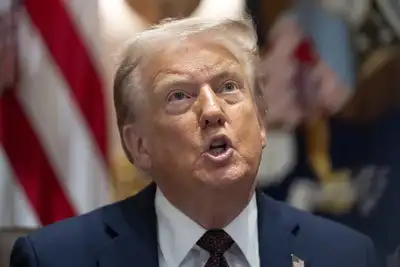ARTICLE AD BOX

President Donald Trump’s administration has rolled out sweeping new visa restrictions that are closing the doors of the United States to Palestinians, particularly students and professionals who had looked to America for education, work, and research opportunities.
The Associated Press (AP) reports that the policy has made it nearly impossible for anyone holding a Palestinian Authority passport to secure a US visa.For thousands of young Palestinians, this means dreams of studying in American universities or building careers through global opportunities are suddenly out of reach. What lies beneath these curbs — security, politics, or something deeper, is what’s at stake.
A new layer of restrictions
Since early August, the US State Department has tightened what it described as “temporary policies” aimed at strengthening vetting procedures for Palestinians. In practice, AP notes, the result has been that virtually all visa applications are either denied outright or not accepted for processing. While the Trump administration has framed the measures as part of a broader push to reform immigration and strengthen national security, Palestinian students and professionals, many of them applying for higher studies, research programs, or work opportunities, are finding themselves shut out of the system.
Beyond students to an entire professional class
The steps go further than restrictions aimed at most other nationalities. On August 1, the State Department instructed consular officers to deny visas to anyone suspected of having present or past ties to the Palestinian Authority (PA) or the Palestine Liberation Organisation (PLO), “regardless of their position or purpose of travel,” according to a cable obtained by AP. That blanket approach has created an environment in which academics, researchers, business leaders, and professionals — many with no political ties are effectively barred from entering the United States.
Educational doors closing
The policy shift has already seen thousands of student visas revoked under what the administration describes as a crackdown on illegal immigration. Many of these, AP reports, were tied to pro-Palestinian or anti-Israeli activity. For students who once viewed the United States as a destination for higher education, exchange programs, and professional growth, the new guidelines have drastically narrowed their options. The denial of access extends even to medical and humanitarian programs. On August 16, the State Department suspended a programme that had previously allowed war-wounded Palestinian children from Gaza to receive medical treatment in the US, according to AP.
“Necessary vetting” or a political signal?
“This action is to ensure that such applications have undergone necessary vetting and screening protocols to ensure the applicants’ identity and eligibility for a visa under US law,” said an August 18 cable, according to AP. However, unlike restrictions on other nationalities, AP notes that Palestinians were offered no exemptions even for official travel or international meetings. Two days after that cable, the United States denied visas to Palestinian Authority President Mahmoud Abbas and nearly 80 officials planning to attend the United Nations General Assembly in New York.
Broader consequences
For young Palestinians, the implications are significant.
The loss of access to American universities, research facilities, and professional opportunities adds to an already limited set of options at home and abroad. For professionals, particularly those in science, medicine, and technology, the restrictions cut off pathways for collaboration and exchange that are often critical to their careers. The Palestinian Authority denounced the visa withdrawals as a violation of US commitments as the host nation of the United Nations, urging Washington to reverse the decision. But for now, AP reports, there has been no indication that the State Department will soften its stance.
What’s at stake
The Trump administration has justified the move as part of its effort to hold the Palestinian Authority and the Palestine Liberation Organisation accountable for “not complying with their commitments, and for undermining the prospects for peace.” To be seen as partners, it argued in a statement cited by AP, the groups “must consistently repudiate terrorism, and end incitement to terrorism in education.” For the students and professionals affected, however, the debate in Washington translates into something more immediate: The loss of opportunities to study, teach, and build futures in the United States. What is at stake is not only diplomacy, but the life chances of an entire generation of Palestinians now shut out from one of the world’s leading destinations for education and work.



.png)
.png)
.png)
















 16 hours ago
5
16 hours ago
5








 English (US) ·
English (US) ·